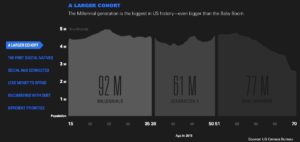Like it or not, the millennial homebuyer is here and real estate agents can’t ignore them anymore. They’re the largest generation in U.S. history; however, millennial homebuyers are facing different challenges on the road to buying a home than previous generations. Agents need to know these challenges and how to be the solution millennials need.
These incredible 2015 millennial real estate stats should convince you this isn’t a subject to take lightly:
- Millennials are the largest living generation at 92 million strong, surpassing baby boomers, who previously held the title at 77 million.
- 93 percent of millennials want to own a home in the future.
- They now have the largest share of first-time homebuyers at 68 percent.
- Ranking higher than any other generation, millennials (84 percent) consider their home purchase to be a good investment.
- 90 percent of millennials used an agent to purchase their home, more than any other generation, which is great news for you.
- And here’s the icing on the cake: millennials are expected to spend about $1.6 trillion on purchasing homes in the next five years, with 80 percent saying they plan to buy a home or already own one.
Even with this wealth of information, the topic of the millennial homebuyer (in reference to real estate) is predominantly written about from only two angles. The first is the standard (marginalizing) rhetoric, saying they are poor communicators, live at home with their parents and expect everything to be given to them. The other angle is more sympathetic, taking into account economy and lifestyle statistics.
However, borrowing statistics and character traits from both of these angles paints a very clear picture that isn’t being talked about much: millennial homebuyers are facing challenges that real estate agents need to know about so they can be part of the solution.
What I’ve learned is that most problems millennials face fit into two categories: character trait challenges and financial challenges. Remember to take all of these challenges with a grain of salt because, as you know, there isn’t a one-size-fits-all list for an entire generation. That being said, here are the top challenges millennial homebuyers face today and how agents can help.
Part 1: Character Trait Challenges
1) Communication Desires & Low Patience
Given than millennials are the first generation to grow up with the Internet, it’s no surprise that they have a desire for instant, on-demand responses. How long it takes to hear back from someone and the method of communication both play greatly into their opinion of an agent’s ability to meet their needs. Having grown up with immediate access to information, don’t be surprised if they’ve already researched an answer to their question before you have a chance to reply.
More so than any other generation, millennials are highly skeptical (only 19 percent of millennials think that others can be trusted). Steeped in skepticism and armed with near-universal access to information, millennials rarely accept that they can’t find the answer to a question on their own. They’re more inclined to form and solidify their own opinions (right or wrong), making your job that much harder.
Agent Takeaway
First and foremost, make yourself available to them and keep your communication timely. Whether by email, text or phone, make sure they know the best ways to get in touch with you. Help them stay as real-time as possible in their search for a home (within reason, of course) and communicate with them like their friends would.
Secondly, keep it brief. A long, four-paragraph email reply to something that could have been answered in a one-sentence text won’t win you points with millennials.
And lastly, keep in mind that whatever you tell them, they’re going to Google and verify it for themselves, so stay honest with them throughout the entire process and get used to the idea that some of your clients will be doing their own legwork.
2) Unrealistic Expectations
This is something agents know all too well. With an ever-skeptical mindset and access to Google, millennials are very good at thinking they’ve got it all figured out before they even start talking to an agent. But thanks to Zillow, Trulia, House Hunters and every design show with a Pinterest board, it’s easy to see why millennials might need a few “reality check” moments when actually starting their hunt for a house.
Agent Takeaway
It’s tempting to just tell them that tools like Zestimate are inaccurate and that renovating a kitchen can’t really be done in a weekend for under $10,000, but use caution. Remember, millennials want a friend throughout this process and they’re already terribly skeptical of most people, so why would you straight up tell them what they think they know is wrong? They don’t accept everything an agent says just because they’re a professional.
The right approach to this situation is to prove your worth as an agent by showing them you have knowledge that Zillow doesn’t. Take the time to explain to them how the Zestimate works, why it’s inaccurate and, more importantly, demonstrate your value at that moment. Don’t leave them high and dry; do some back-of-the-napkin math to illustrate your point.
When I was hunting for a house (full disclosure: I’m a millennial and have learned a lot in the process), my go-to tools were Trulia and Zillow. Little did I know how many listings I wasn’t seeing. My agent took the time to validate my eagerness (super important) and then got me signed up with access to his MLS portal and daily emails with current listings. Not nearly as sexy as my apps, but 1000 times more accurate. And rather than the agent doing the search for me, he was searching with me.
Agents should provide easy access to informational avenues earlier on in the house-hunting process to help alleviate misinformation and give millennial clients a way to keep a sense of control over their own house-hunting process; they don’t want to feel pushed or sold in any direction.
3) Picky and Not Going to Settle
In more ways than one, millennials really don’t want to settle down…yet. Apartments can offer a lot of lifestyle benefits that keep them from buying a house, like access to bars, food, and friends. And with the option to move every 12 months, upgrading your living arrangement to the newest layout trend is a lot easier than renovating a house or condo. They also aren’t as tied to employers as previous generations, making it easier for them to jump from job to job every few years, and not necessarily in the same city.
On the relationship front, settling down in life is lower in priority too. In 1968, more than half of 20-somethings were married. Compare that to 2007, when fewer than one in four young adults were married. Those millennials on the hunt for houses aren’t looking for big family homes. Quite the opposite, actually. According to the National Home Builders Association, millennials are in the market for smaller, more affordable homes, but they’re not willing to compromise on features or quality.
Agent Takeaway
Having lived in three apartments in four years in Austin, I can tell you just how true this reluctance to be tied down to one place is for most millennials. But after having a discussion with my agent about how much I was paying in rent, it became alarmingly clear how much more I was paying a month in rent than it would be to pay a mortgage. I’d much rather be putting money into building equity for my future home plans than into the black hole that is monthly apartment rent. Remember, millennials view real estate as a smart investment, so use that to your advantage and paint a picture of the future for them.
As for the millennials already on the hunt, use your skills as an agent to coach them on what to look for. If they want small with features, they might be adding a bit to their commute. If they want a particular neighborhood, help them to see houses they would normally dismiss for lacking in features as being contenders by laying out the updates they could make. You obviously can’t push them to settle down with a significant other, so pitch the roommate angle for a house. You’d be surprised how well that goes over.
Part 2: Financial Challenges
4) Jobs and Salary
Did you know that, according to the New York Times, nearly half of recent college grads are unemployed, or underemployed? That means that even though they’re out of college, carrying debt (more on that in a bit), and eager to start their careers, they can’t, and end up working a job that doesn’t require a college degree. Pair that with sub-par wage growth over the past two decades, and it’s easy to see why it might be hard to help out the millennial homebuyer. Just take a look at these salary trends from Goldman Sachs:

Agent Takeaway
There is a silver lining here. According to the Bureau of Labor, as of January 2015, employment among 25- to 34-year-olds reached its highest level since the end of 2008. Good news for agents everywhere! These next few years are poised to be very lucrative as millennials eager to become first-time homeowners gain the financial ability to buy.
In the meantime, agents can guide millennials who are earning less-than-ideal salaries toward the affordable housing programs in your area to see if they qualify.
5) Rising Rents, Student Loans, and the Down Payment
Of course, it doesn’t help that on top of low salaries and underemployment, millennials face ever-annoying annual rent hikes. The struggle is real. My first apartment in Austin four years ago is now renting for 50 percent more than what I was paying for it, and average wages certainly haven’t risen that much since then. Austin is an extreme example, but if you pair this scenario with the subpar salaries many millennials operate on, you’ve got a large group of people who could easily be paying less for a mortgage but are unable to save money for the initial down payment.
To put this into perspective, according to Harvard University’s Joint Center for Housing Study, the cost of renting is already outsized due in part to the high demand for apartments. Of renters, 50 percent are cost-burdened and 28 percent spend more than half their income on rent. That’s a lot to spend on rent!
With the bulk of a typical millennial’s paycheck already going towards their housing, you would think that they’d have extra incentive to save up a down payment for a house. But you’re forgetting about the student loan debt they’re carrying. Let me throw five alarming stats at you:
- This year, 54 percent of millennials cited student loan debt as the biggest obstacle to saving a down payment.
- In 2004, average student loan debt was $15,000 – by 2013, it had ballooned to $27,000, and the burden is only growing.
- Nearly 45 percent of 25-year-olds have outstanding loans, with an average debt above $20,000.
- Millennials are the second-most fiscally conservative generation since the Great Depression.
- About half of millennials in a 2014 Wells Fargo survey said more than half of their income goes directly toward paying off debt, and 56 percent said they are living paycheck to paycheck, unable to save for the future.
Millennials are anything but lazy; they’re careful with money and financially burdened. In short, mounting student loan debt and rising rent costs make it very difficult for them to save up money for a down payment.
Agent Takeaway
While you can’t eliminate their down payments or stop the rising cost of rent, you can help them out where they need it most: finding cheap rent. The agent who helped me find an apartment four years ago knew that by befriending me early on, he could secure my business for the future. Sure enough, four years later with a down payment ready to go, I’m using him to buy my first home.
The other takeaway for agents here is that you are more familiar with everything that goes into the financial process than your millennial client, so be their friend and mentor. Coach them on how they can start planning for their first home years before they’re able to do so, and it just might pay off down the road.
6) Credit Scores and Loan Qualification
On the plus side for millennials, they carry less credit card debt than any other generation before them, holding an average of $2,682 in credit card debt (compared to the $5,000 average of Gen X and baby boomers). However, millennials are two to four times more likely to make a late payment than older generations.
On the downside, millennials often have a hard time getting loans due to either having no credit whatsoever or having long gaps of missed student loan payments and missed credit card payments. 45 percent of millennial homebuyers said it was harder to apply and get approved for a mortgage than they expected.
Agent Takeaway
A lot of helping a millennial homebuyer will rest on the shoulders of a good agent. It is possible for millennials to become homeowners, but it will take the intellect of an agent who is well versed in the latest changes in the mortgage landscape to help them partner with the right mortgage lender.
Let your millennial clients know that there are well-managed programs out there to fit their needs. There are lenders who have (responsibly) lowered minimum credit requirements, offer simplified loans that have no lender closing costs for borrowers and have extended eligibility to more property types. Keep an eye out for these lenders and use them to help turn your lookers into buyers.
Wrap-Up
Millennials are a huge chunk of the population, and just like the generations before them, they have their share of challenges. But agents can’t ignore the fact that millennials are the next wave of “mature consumers” embarking on their first big life decisions. They rely on technology and DIY tools for information more so than their predecessors, and as natural skeptics, they will research everything before making a big decision. They face their share of financial problems, but none that are completely insurmountable.
You need to be armed with this information so that when you do get them to the table, you’re ready for the challenges that they’ll face (and not taken aback by them). Millennials will look to you for answers, and if you can validate for them what they have already researched, you can gain their confidence and business.



![Better Email Etiquette Equals Better Marketing Results [16 Rules]](https://www.outboundengine.com/wp-content/uploads/shutterstock_411184843-1-400x250.jpg)

